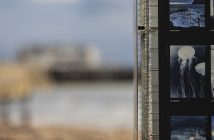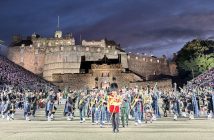Tanen found himself commuting between Hollywood and Peru during the shoot, and then on to Taos New Mexico for the editing; both stages were fraught with danger and despair. “People in the crew flew down there, went into the jungles, and simply never came back!” Tanen told us. A mad cocktail of drink, drugs and willing native women overwhelmed many, with Dennis acting as a stoned ringmaster pulling all the strings, but mostly tangling them into a giant Gordian knot. Tanen remembers a visit when he literally encountered a genuine Taos orgy. Not a man to be shocked easily, Ned was aghast, “There were thrusting buttocks and tits everywhere, it was like a cut scene from Caligola but for real!” In a hopeless attempt to conduct the business he had come for, he managed to locate Dennis’ writhing body and lightly tapped him on the shoulder, ”So sorry to interrupt, but may I have a quick word with you about how the edit is coming on?”
As had happened with Easy Rider, the first edit – a four-hour cut which Dennis refused to trim down – nearly derailed the whole project. Ned’s frequent, if mainly abortive visits to Taos were punctuated by trips to the fleapit cinema that Dennis had set up for the locals. But attempts to introduce films like Jean-Luc Godard’s Les Caribiniers (1963) to them only resulted in a multi-coloured decoration of local fruit and vegetables being hurled at the screen.
When The Last Movie was finally given a strictly limited US release, this near-impenetrable stream-of-consciousness piece of avant-garde cinema left much of the small audience who bothered to see it confused. This seeming farrago effectively buried Dennis’ directorial career for the rest of his life. But here we are getting ahead of ourselves again, so let us return to the mid-1960s, when youthful enthusiasm and simple pleasures first drove the likes of Hopper, Peter Fonda, Henry Jaglom and Peter Bogdanovitch towards the cinema, and all the promises it seemed to hold for them.
BREAKING IN
At that time, Roger Corman – the king of low-budget exploitation movies – had established a market for biker flicks with The Wild Angels (1966) and Devil’s Angels (1967) and hoped to produce Easy Rider with the backing of cigar-chomping lawyer Sam Arkoff. One day Dennis took a call from friend Peter Fonda who was at a film festival in Canada (they had previously agreed never to do another biking picture fearing they would end up branded as latter-day Roy Rogers and Gabby Hayes). Fonda said he was in a meeting with Arkoff and he had pitched him a story “It’s about a couple of dirt bikers who make money in a drug deal in Mexico, buy two new gleaming bikes, head to New Orleans and get stoned, then get shot by a couple of duck hunters. He said you could direct and I can star! What do you think Dennis?” Dennis replied, “Are you sure Arkoff said he has the money?” “Oh yes,” comes back Fonda “he said he’d give us the money alright”. “Well” retorted Dennis “I think it’s a great story!”
Shortly after at a meeting with Fonda, Corman and Dennis, Arkoff became concerned by the explicit language Dennis was using, and demanded a clause in the contract stating that Dennis could be replaced as director if he fell behind schedule. Hopper’s explosive “Fuck you!” could be heard all over Burbank. Shortly after this abortive meeting, Jack Nicholson moved the whole project to Columbia Pictures. In return for packaging and promoting the project, he took the role of George Hanson, which turned him into a star overnight – a part the unlucky Bruce Dern had previously been earmarked to play.
At this stage of his career Dennis was basically uncontrollable. He made enemies left, right and centre and cared not a jot about it. For instance, he found himself sitting next to George Cukor, director of The Philadelphia Story (1940) and A Star is Born (1954), at a Hollywood dinner. In horror, fellow guest Peter Bogdanovitch heard him say to Cukor, “You’re old Hollywood and we are going to bury you!”
The way that Easy Rider was made and finally completed is a tribute to producer Bert Schneider’s ability to hold together a potentially disintegrating project. Drink and drugs fuelled the production with a great deal of testosterone added to the mix. The shoot began with an infamous trip to the Mardi Gras in New Orleans, with Dennis, by all accounts, behaving like Orson Welles on speed – the unit returned with about 20 hours of incomprehensible 16mm footage. Again it was Bert who had to drag the two antagonists, Dennis and Peter Fonda (who played the lead, Captain America) apart, thereby preventing mutual emasculation.
Weeks of production activity on the road covered the full gamut of fist fights, orgies, drug binges, drink and rock and roll! After the New Orleans Mardi Gras, Fonda and Dennis’ brother-in-law, Mike Hayward, returned to LA with a stack of on-set tape recordings of Hopper ranting, determined to have him fired from the picture. On one of these tapes, he was heard demanding to know why a particular lighting rig was not in evidence on set. ”Red, blue and green lights making a white light goddamn it!” Schneider conceded that Dennis sounded “a little agitated”, then added, “but if he had asked for a certain red-blue light in advance, and it was not there, then surely he had cause to be upset, didn’t he?” Such a sympathetic view, in the guise of an unanswerable question, was why Schneider was widely regarded as “The Last Tycoon” of his generation.
According to Henry Jaglom, a fellow veteran of the independent film sector, Easy Rider was shown in its five hour and twenty minute version to an eminent French film critic who exclaimed, “It’s a masterpiece, don’t cut a single frame!”, which Dennis adopted as his own mantra. Enter Schneider, from camera left, to the rescue once more, setting Jaglom at work at one end of the cut, with Jack Nicholson editing at the other end until they met somewhere in the middle. Dennis always maintained that he was personally responsible for the edit, but my pretty strong guess is that Nicholson and Jaglom helped him a lot, and he ultimately approved their work. Dennis also said, well after the event, that he had intended to win the top award at Cannes, but the fact remains that the Palme d’Or going to Easy Rider was a great surprise, and it heralded a new era of bold, uncompromising truly independent cinema.




